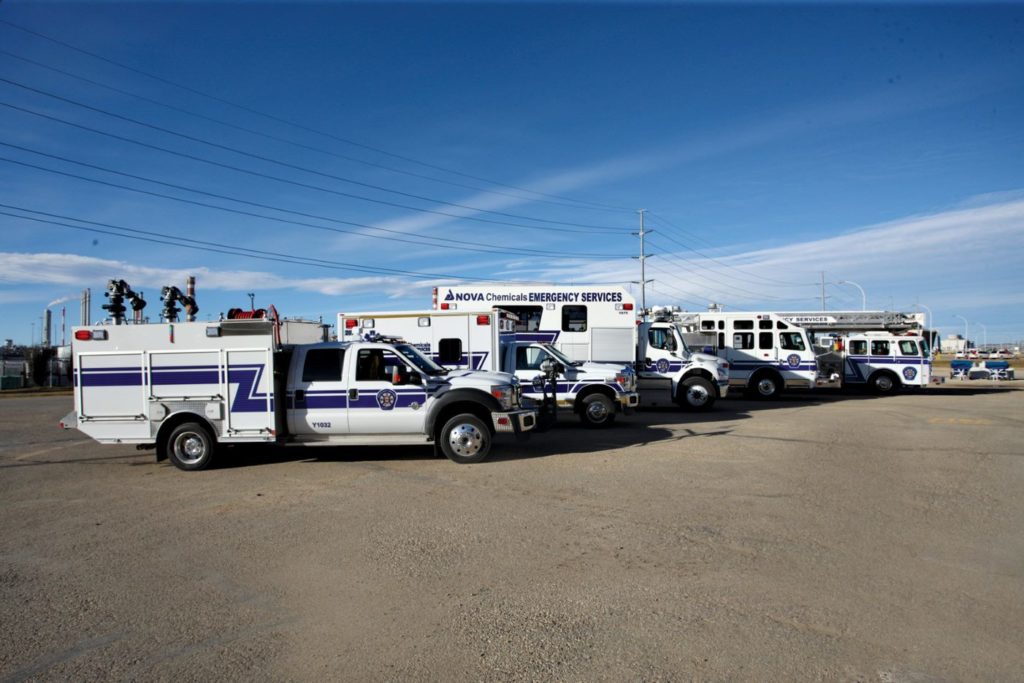Responsible Care & Sustainability
Environment
Here at the Joffre Site, we operate our manufacturing facilities responsibly, adhering to the Responsible Care principles developed by the Chemistry Industry Association of Canada (CIAC). All aspects of our operations reflect a safe and caring attitude for our employees, our communities and the environment. We are committed to minimizing our impact on the environment because it is the right thing to do, and is key to the sustainability of our business.
Areas of Focus
Our Responsible Care approach is supported by policy, a management structure and a comprehensive Environmental Management System. The System helps us stay on top of many initiatives, track performance and communicate our progress to stakeholders. It organizes our commitments and regulatory responsibilities to make sure we have the right environmental programs in place to continuously improve.
This approach calls on every employee to work in ways that help us achieve our environmental performance goals. A staff of focused professionals located here at the Joffre Site support employees in their daily work and future planning. They also work with various groups and agencies with environmental mandates that may influence our operations or the communities where we live.
Working With Others
NOVA Chemicals has relationships with groups and agencies that have a specific mandate related to environmental issues. Such co-operative working relationships are part of NOVA Chemicals commitment to reducing the impact of its operations on the environment.
Social Responsibility
You’ll find more information about NOVA Chemicals and Responsible Care in the Social Responsibility section of the NOVA Chemicals website.
For more information about the Chemistry Industry Association of Canada, visit the CIAC website.
Occupational Health and Hygiene
Our health and occupational hygiene professionals provide a fully integrated employee wellness support service.
Registered occupational health nurses and a part-time physician offer first aid, health-related monitoring and life-style awareness education. Registered emergency medical technicians provide 24-hour first aid response.
Professional industrial hygienists support health professionals with an in-depth knowledge of all products and chemicals on site – their properties and precautions. Their role is to anticipate, recognize, evaluate and control health hazards in the workplace.
Our comprehensive occupational hygiene program meets or is more stringent than regulatory standards and industrial guidelines. It includes:
- assessment of chemical, physical (i.e. noise) and biological (i.e. mold) health hazards and workplace exposure monitoring
- development of safe work practices
- education of potential hazards and personal protection for employees
Safety
We work to protect people, assets and the surrounding environment in many ways — from initial design to effective emergency response if an incident occurs.
Facility Loss Prevention
Risk engineers assess and plan against stringent risk-based standards. Each facility is designed to prevent incidents that could cause harm or extended operating outage. For example:
- facilities are designed to minimize impact of prevailing winds or hazards from a flammable leak
- combustible gas detectors are placed throughout each facility to detect vapor releases and the detectors are monitored by control rooms
- automatic fire protection is provided by sensor-operated, remote sprinkler systems
- high pressures within manufacturing processes are controlled by automatically venting the gas to elevated flare systems (the principle safety device for near-complete combustion of hydrocarbons when in upset operating conditions or during a shut-down or re-start)
The responsibility we have to our employees and neighbors, and the considerations related to lost revenue and equipment replacement costs all provide incentive to design facilities to very high standards, and to have the management systems in place to address associated risks.
Emergency Preparedness and Response
Our philosophy is ‘One Site… One Emergency Response Plan.’ All site facilities and infrastructure are included within a common, integrated emergency management plan. Training response personnel and testing of emergency preparedness capability is critical. We have more than 100 drills at the site each year to practice, test and document opportunities to improve.
Emergency management includes equipment resources. On site, we have more than $2 million of emergency response equipment including three fire trucks (rapid response, aerial capacity and foam delivery) and two ambulances. An Emergency Operations Centre, located in our security building, provides emergency leaders with a state-of-the-art facility to manage incidents in cooperation with personnel in the field.
Community Partnerships

We partner with public agencies in responding to community emergencies that could result from Joffre Site operations. To ensure the on-going needs of potentially impacted parties are considered and addressed, we maintain an active Community Emergency Planning Committee of local residents, industry and Lacombe County Disaster Services. Meeting quarterly, the group reviews plans, tests communication systems and maintains a resident list for emergency notification.
As a member of the Lacombe County Mutual Aid Organization, we work with other area emergency preparedness organizations to train and test the effectiveness of individual emergency response plans and equipment to ensure we can work well together. As official signatures to the Mutual Aid Agreement, site emergency response personnel will respond to assist with local emergencies until the municipal response is on scene.
Automated Community Notifications System
A unique telecommunications service can quickly notify residents within 5 kilometers of the Joffre Site if an incident resulting from our operations has the potential to affect them or that neighbors may be concerned about.



